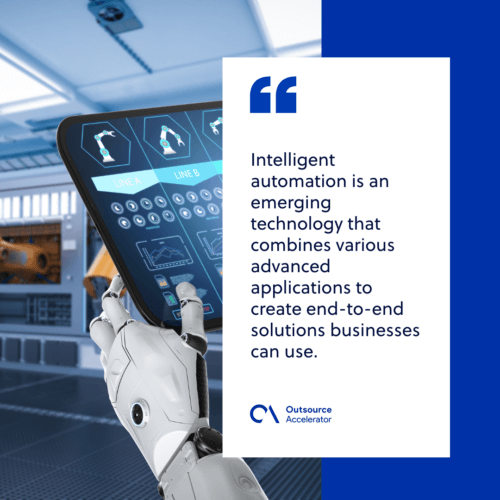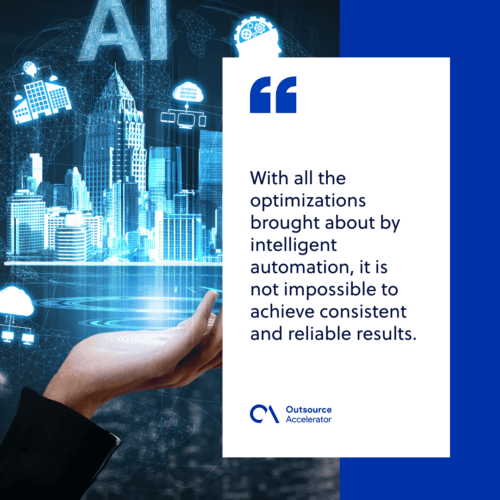Intelligent automation: Your guide to business success

In recent years, business operations have become leaner, faster, and more efficient. These improvements are hugely caused by new technologies developed to augment customer experience.
However, not all organizations can adapt to these changes due to financial restrictions and the lack of familiarity with navigating these innovations.
The good thing is there are third-party providers that give access to innovations like intelligent automation services at affordable rates.
But what is intelligent automation? What does it offer to enterprises? What technologies work best alongside it? And how does it differ from other well-known technologies and applications?
All of these and more are in the following sections below.
What is Intelligent automation?
Intelligent automation is an emerging technology that combines various advanced applications to create end-to-end solutions businesses can use.
The main feature of this technology is that it can process, think, learn, and adapt on its own depending on the various factors and variables present in its surroundings.
Its applications include artificial intelligence, robotic process automation, and character recognition. The capability to combine different technologies made it possible for it to be called intelligent process automation (IPA).

Components of intelligent automation
Intelligent automation combines two or more technologies to augment labor-intensive and rules-based tasks.
To consistently provide this level of service, the following applications and technologies are utilized:
- Artificial intelligence – these are systems that imitate human capability to be intelligent and adapt knowledge. The main advantage of AI is that it can analyze data faster and more accurately than people.
- Machine learning – an AI application that processes and identifies several patterns and trends in a structured data set. This process data produces actionable insights to make predictions and suggestions.
- Computer vision – a tool that converts all scanned images and documents into editable texts.
- Natural language processing – a software that enables smart recognition of recordings and turns them into navigable data.
- Process mining – an analytical approach that aids in diagnosing various business processes and provides enhancements based on generated insights.
Benefits of intelligent automation to businesses
Intelligent automation has self-learning capabilities. It allows employees to focus on other important parts of the business operation instead of engaging in resource-intensive tasks.
This new era of collaboration between IT-enabled solutions and employees is crucial to driving sustainable business models.
The primary benefits of intelligent automation are as follows:
Workforce augmentation
As stressed, intelligent automation helps employees perform their responsibilities. This is true, especially in processing data and transforming them into actionable insights.
This efficient process accelerates production and delivery of commitments ensuring better turnover in a matter of days.
The best thing about intelligent automation is that there is little to no risk of compromising the quality of outputs. The accuracy is on another level, enabling business leaders to reap the benefits they require for faster ROI.
Redefining accuracy
More often than not, employees commit countless errors in the interest of speed and customer satisfaction. Regardless of employees’ good intentions, it may often lead to countless mistakes affecting the quality of their work.
With intelligent automation, data are processed accurately despite executing repetitively. Not to mention, it does not take long hours to process, but just in minutes.
Customer experience
With all the optimizations brought about by intelligent automation, it is not impossible to achieve consistent and reliable results. In fact, customers can expect the same level of convenience and output that improves over time.
This can serve as a competitive advantage for organizations over their competitors. This distinction is what their customers will look for and in other brands they consume, making the enterprise more memorable than others.

Intelligent automation in a post-pandemic world
The COVID-19 pandemic has shown companies that in order to survive the new realities of the business world, smart and leaner end-to-end digital processes are necessary.
Intelligent automation has proven to drastically lower business costs and improve the capacity, scalability, and performance of teams. It does not pose any threat to the livelihood of employees but rather is a force multiplier in improving their performance.
These changes have significantly changed the expectations on the part of end-users and business practices of companies leaning towards sustainable models.
Intelligent automation enables businesses to predict future trends, giving them a better preparation period to adapt and augment their offerings.
Explore Datamatics‘ intelligent automation platform and see how it can revolutionize your business operations.







 Independent
Independent




